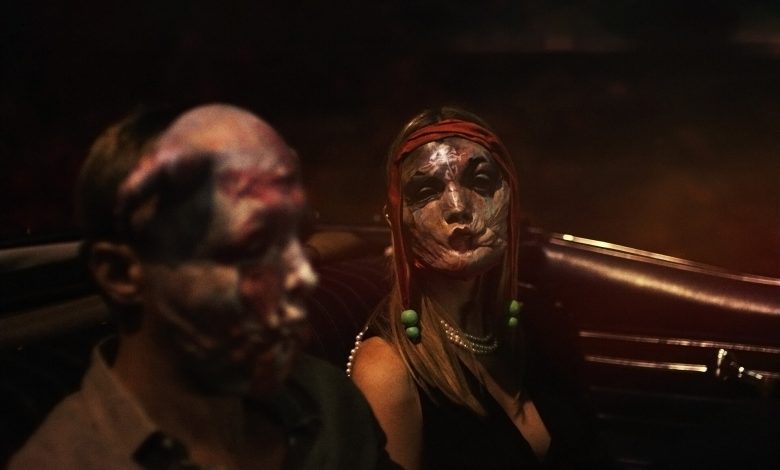Infinity Pool: Scary, Unsettling, and Underdone

Charlie von Peterffy ‘24 / Entertainment Monthly Staff Writer
Infinity Pool is a visually mesmerizing film with intriguing concepts about class, humanity, and morality. With rock-solid performances from its star-studded cast, like Alexander Skarsgård (James Foster) and Mia Goth (Gabi), the film also completely shocks audiences. But, unfortunately, it also has a lot of half-baked plot points, flat dialogue, and surprisingly underdeveloped characters that keep the film from reaching its fullest depth and conceptual limitations.
Infinity Pool follows Foster, a struggling author, as he goes on a vacation with his wife, Em Foster (Cleopatra Coleman), in the fictional seaside country of Li Tolqa. While there, they meet a group of other holiday visitors, and quickly become friends with them. As Foster becomes closer with them, he starts becoming seduced by Gabi, who convinces him to commit crimes on the island. When caught, it is revealed that Li Tolqa has a zero-crime policy. Thus, Foster and the group have two options: they either can face execution or, if wealthy enough, they can pay to have exact replicas of themselves (with all memories and personality traits included) so that these doubles can face punishment instead. Going with the second option, Foster continues to act recklessly, committing endless crimes because he can afford to continue getting doubles. Foster deteriorates as he commits progressively more violent crimes at the will of the rest of the group, forcing himself to reevaluate what it means to be human, alive, and sentient. Only time can tell how far a person can push themselves before they become irredeemable.
The story, for the most part, is fascinating. The movie heightens the terror of its already intriguing concept by throwing violent altercations and emotionally distressing dialogue at viewers from start to finish. By presenting a story about the wealthy finding loopholes to do whatever they please, viewers get the gruesome, selfish elements of human nature and thought-provoking ideas about how money corrupts. These concepts make for an enticing adventure that delivers more than meets the eye.
Unfortunately, the way the story unfolds could be better. Throughout the film, various ideas and subplot beginnings arise. But, while they are intriguing, many of them are never mentioned again. This leaves the film feeling unfinished, as some of its most fascinating ideas are sidelined by its end. In addition, there are a few plot holes in how the entire story is legal, especially when considering the setting’s supposed zero-crime policy. Too many questions arise out of these subpar explanations, making the whole film feel unrealistic. These flaws do not destroy the story’s value, but they do weigh it down.
The cast is excellent, although that is more or less a given with most of the cast being well-known to horror and general film fans. With Goth’s recent work in director Ti West’s film duo X and Pearl, she established herself as a sinister actress with various tricks. Therefore, her presence here is welcome, bringing the film’s quality much higher than it would have been otherwise. Skarsgård is also a skilled actor who shows off his range here, and the rest of the cast do excellent jobs in their roles. For performance, the film succeeds exponentially.
While the cast does a great job of vitalizing their roles, the characters feel underwritten. Besides the two main stars, barely anyone has enough screen time to explain their motivations. They all feel like caricatures, showing the worst that rich people can do when they can buy immortality. The main stars themselves do not have character arcs. Gabi (Goth) feels more like the psychedelic hand to guide James Foster (Skarsgård), rendering her a lifeless vessel of clinically insane dialogue and bone-chilling actions; there is no depth beyond that. Foster changes the most by the end, changing from a respectable writer to a greedy, vicious dog. Watching him go through endless bouts of torture, trippy altercations, and endless segments of morality destruction is terrifying and strangely relatable. Unfortunately, the film’s ending is quite stereotypical, deflating the integrity of Foster’s journey a bit. Nonetheless, he is a much better character than any of his co-stars.
The visuals are stellar. From the film’s unique cinematography that purposefully makes everything feel immediately unhinged to its colorful, mesmerizing trippy sequences, it has a disturbing horror lens that satisfies from beginning to end. This film is a must for anyone looking for a scary and distorting ride.
The film holds up because of a satisfying visual pallet, solid performances, and complex concepts. Its characters are nothing good and feel disconnected from reality after minimal forethought of its big plot holes, but it intelligently scares more than it strains enough to kill. This film could be a valuable watch for intellectual horror fans, indie fans, and anyone looking for something different. Just do not expect a perfect plot, well-written characters, or valid justification for the story’s realism.